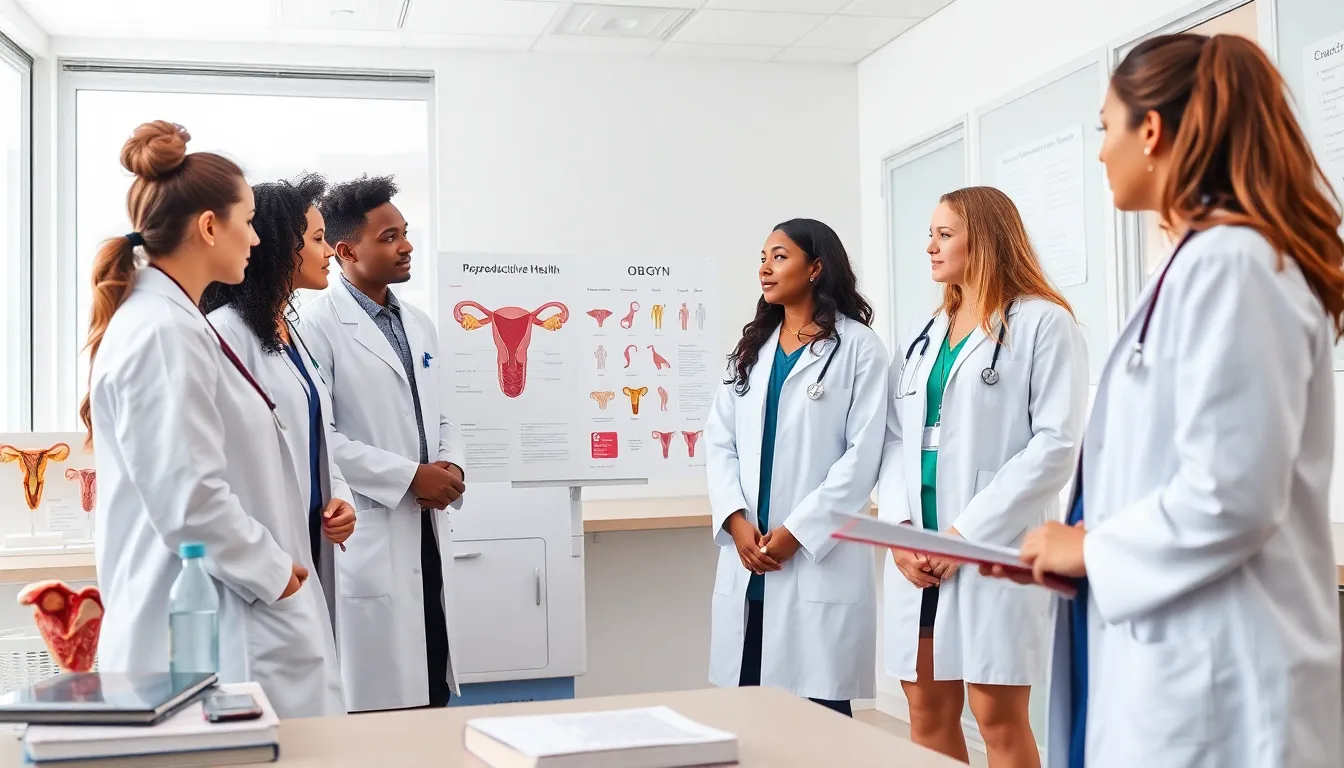Choosing a career in obstetrics and gynecology is like signing up for the ultimate rollercoaster ride—full of twists, turns, and the occasional surprise. OBGYNs don’t just deliver babies; they help women navigate the thrilling journey of life, from adolescence to menopause. It’s a field where every day brings new challenges and rewards, and it’s never a dull moment.
Table of Contents
ToggleUnderstanding OBGYN College
OBGYN college provides essential training for future obstetricians and gynecologists. This education prepares them for a diverse range of medical challenges.
Definition of OBGYN
OBGYN stands for obstetrics and gynecology. This specialty focuses on women’s reproductive health, including pregnancy, childbirth, and disorders of the reproductive system. An OBGYN addresses health concerns spanning from adolescence through menopause. Complications during pregnancy and childbirth get specific attention, ensuring both mother and child receive adequate care. A well-rounded understanding of both disciplines equips OBGYNs to deliver comprehensive healthcare.
Importance of OBGYN Education
OBGYN education holds significant importance for several reasons. First, medical training ensures practitioners possess the necessary skills to handle complex medical situations. Evidence-based practices form the foundation of effective treatments, ensuring high standards of patient care. Graduate programs typically include rigorous coursework and hands-on clinical experience. Additionally, staying updated on advancements in medical technology and treatments enhances patient outcomes. Graduates emerge as knowledgeable professionals ready to support women’s health throughout various life stages.
Admission Requirements

Admission to OBGYN college involves specific academic and procedural guidelines. These guidelines ensure candidates possess the foundational knowledge and skills necessary for a challenging medical career.
Academic Prerequisites
Candidates must complete a bachelor’s degree, ideally in a science-related field. Strong coursework in biology, chemistry, and physics provides essential knowledge for medical training. Aspiring OBGYNs often excel in standardized exams like the MCAT. Achieving high scores enhances their applications significantly. Additional experience in healthcare settings, such as internships or volunteer roles, bolsters their academic foundation and demonstrates commitment.
Application Process
The application process typically involves several key steps. Submitting the primary application through the American Medical College Application Service (AMCAS) is often required. Each OBGYN college may have unique deadlines, so candidates must stay organized. Secondary applications usually follow, allowing schools to gauge candidates’ interests more deeply. Letters of recommendation play an important role, highlighting personal attributes and academic achievements. Finally, interviews assess candidates’ suitability for a demanding yet rewarding profession in OBGYN.
Coursework and Curriculum
OBGYN college offers a comprehensive curriculum designed to equip students with essential medical knowledge and skills. Emphasis on both theoretical foundations and practical applications ensures effective learning.
Core Subjects
Students engage in core subjects including anatomy, physiology, and pharmacology. These crucial areas provide a solid understanding of human biology and drug interactions. Additional courses cover obstetrics, gynecology, and reproductive endocrinology. Knowledge gained in these subjects forms the basis for diagnosing and treating female patients. During their studies, students also explore ethics and medical law, which highlight the importance of professional responsibilities in healthcare.
Practical Experience
Hands-on clinical experience plays a vital role in OBGYN education. Students participate in clinical rotations at hospitals and healthcare facilities, where they observe and assist experienced professionals. Participation in these rotations fosters skills in patient examinations, prenatal care, and surgical techniques. Exposure to real-life scenarios reinforces theoretical knowledge and enhances confidence. Through practical experience, students gain insights into patient interactions and medical decision-making, preparing them for future challenges in the field.
Choosing the Right OBGYN College
Selecting an OBGYN college requires careful consideration of several key factors that impact educational quality and future career prospects.
Factors to Consider
Accreditation plays a crucial role in ensuring a college meets high educational standards. Location affects access to internships and clinical rotations, making nearby hospitals advantageous. Curriculum depth is essential; students should study topics like anatomy and pharmacology thoroughly. Faculty expertise can influence learning experiences, so researching professors’ backgrounds is beneficial. Financial aspects, including tuition costs and available scholarships, also warrant attention. Students must evaluate the school’s resources for research and clinical training, as these enhance practical knowledge. Lastly, networking opportunities through alumni connections can facilitate career advancement upon graduation.
Top OBGYN Colleges
Harvard Medical School ranks among the top institutions, offering a comprehensive OBGYN program known for its research opportunities. Johns Hopkins University provides world-class training with access to cutting-edge medical facilities. University of California, San Francisco, is renowned for its emphasis on women’s health and diverse clinical experiences. The University of Pennsylvania boasts a robust curriculum, integrating essential hands-on learning experiences. Emory University offers strong mentorship programs that connect students with leading professionals in the field. Stanford University combines innovative teaching methods with a focus on research, preparing students for modern challenges in obstetrics and gynecology.
Career Opportunities After Graduation
Graduates from OBGYN college explore various career paths within the field of obstetrics and gynecology. Opportunities abound in clinical practice, research, and academia, enabling them to make significant contributions to women’s health.
Residency Programs
Residency programs present vital training opportunities for new OBGYN graduates. Strong programs usually last four years and encompass various clinical rotations. Each rotation provides exposure to obstetrics, gynecology, and subspecialties, enhancing practical skills and patient management. Graduates take responsibility for patient care under the guidance of experienced faculty members. Resources and support systems typically strengthen the learning process, enabling residents to develop autonomy and clinical judgement.
Specializations in OBGYN
Specializations in OBGYN allow practitioners to focus on specific areas of women’s health. Opportunities include maternal-fetal medicine, gynecologic oncology, reproductive endocrinology, and urogynecology. These subspecialties require additional fellowship training, offering in-depth knowledge and expertise. Each specialization addresses unique patient needs and contributes to advances in medical research and treatment. Practitioners often engage in clinical practice, research initiatives, or teaching roles, enriching their professional experience and impacting women’s health positively.
Choosing a career in obstetrics and gynecology is a commitment to making a meaningful impact on women’s health. OBGYN college equips aspiring professionals with the necessary skills and knowledge to navigate the complexities of this dynamic field. From rigorous academic training to hands-on clinical experiences, students are prepared to face the challenges that come with the territory.
Opting for the right OBGYN college can significantly influence future career paths and opportunities. With a variety of specializations available, graduates can tailor their careers to align with their passions, whether in clinical practice, research, or academia. The journey through OBGYN education is demanding but ultimately rewarding, paving the way for a fulfilling career dedicated to improving the lives of women.




